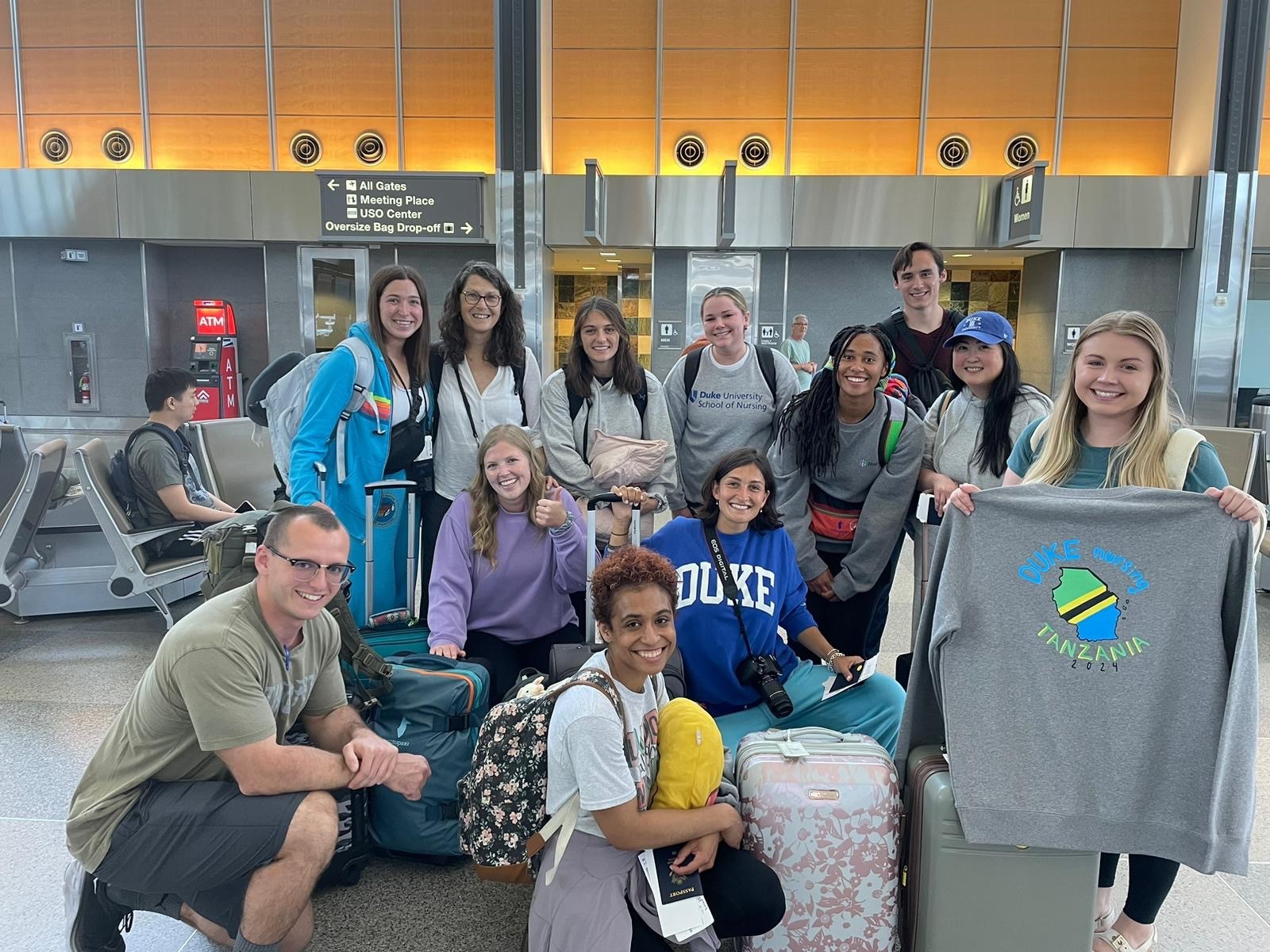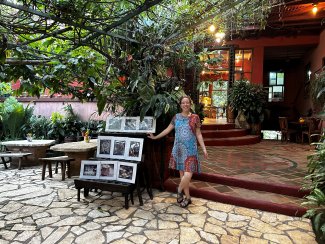Global Clinical Immersions Offer Unique Opportunities for Healthcare Training
Dozens of School of Nursing students participate in these programs every year, gaining invaluable cross-cultural experience in nurse-led care.

From a remote village in the Honduran highlands to urban clinics across Manila, more than 50 Duke School of Nursing students (as well as Duke Occupational Therapy and Physical Therapy students) participated in global clinical immersion experiences at the end of this past semester. The students worked under the supervision of School of Nursing faculty and other clinical leads to give direct care to hundreds of patients at clinics in Honduras, Tanzania, Barbados, and the Philippines. Here, in their own words, are just some of the insight students gained from their experiences:
Kim Garfield, FNP MSN Student, Honduras
Embracing cultural competence.
“It was incredible to witness growth within myself and our team amidst the highs and lows of providing healthcare in rural Honduras, especially in challenging environments like make-shift clinics without modern technology. The gratitude from patients receiving basic care highlights the profound impact even the simplest interventions can have on people's lives. Even in the smallest moments, like enjoying a cup of coffee grown and roasted by a community in rural Honduras, that added the richness to the experience and reminded me of the interconnectedness of humanity. These experiences helped shape not only my skills as a healthcare provider but also my perspective on the world and the importance of cultural appreciation and understanding in delivering effective care.”
“A part of successful healthcare starts with cultural competence. Without understanding the cultural background, beliefs, and living situations of the patient population, interventions may not be accessible or applicable. As a future provider, I will have to always remember that for my patient to have successful healthcare outcomes, I will need to blend evidence-based practices with the patient's cultural beliefs to ensure that interventions are not only accessible but also respectful and effective. This is a crucial aspect of providing patient-centered care and will foster trust and rapport with my future patients.”
Zachary Smith, ABSN Student, Tanzania
There are many ways to do the same task
“The most memorable part of the trip for me was learning how to treat people in a rural clinic that has very limited supplies. I loved learning about different cultural norms in medicine and seeing how the medical personnel interacted with their patients.”
“What I learned during the trip will influence my future nursing career in many ways. This trip taught me that there are many ways to do the same task and that nursing is a very adaptable career. This trip helped me to be more confident in my own skills and helped to push me out of my comfort zone.”
Kali Emans, ABSN Student, The Philippines
Lifelong learning
“One thing I will take with me into my nursing career is how intentional and creative the Filipino nurses and doctors were. Even when resources were scarce, they did their absolute best to provide excellent patient care with what they had. A moment that will stick with me forever is when we met a doctor during our labor and delivery shift. When introducing herself, you could tell she was the type of doctor who was rich in wisdom and well-respected. As she introduced one of the residents, she said, ‘It is ingrained in their minds and their hearts to teach.’ Not only did this sum up the Filipino approach to healthcare, but also a reminder to maintain a posture of teacher and learner.”
Alana Carlucci, ABSN Student, Tanzania
Leading with compassion
“The most memorable part of my trip was the welcome we received from the community at City of Hope. We were welcomed with joyous celebrations, singing and dancing, praise, prayers, and gratitude. I will never forget the moment when the children at COH received a teacher’s approval to officially greet us. I have a vivid image and a heart-warming sensation that brings me to tears, just recalling the urgency of the children to rush up the stairs to deliver us their hugs.”
“One of the biggest takeaways, from my time spent in the Amani Medical Center, is how important it is to be compassionate and resourceful as a nurse. As a student and a future nurse, it is imperative to learn how to problem solve to effectively respond to situations. It is important to be adaptable, creative, and responsive in the face of obstacles and/or challenges. Being resourceful is beneficial in promoting positive ways to cope and respond in difficult or unexpected situations. Building resourcefulness will equip me with the tools I need to respond to a variety of different situations. It will also allow me to gain the trust and confidence of the patients I am serving and the healthcare team I am a part of. Along with this skill, I recognized the power of compassion. As a soon to be new-graduate RN, entering a service industry, I will prioritize and allow the compassion in my heart to drive my deliverance of care. The medical staff at the Amani Clinic radiated compassion and delivered care based on this fundamental value. They served their community with an empathetic urgency and welcomed us students with a compassionate desire to teach and encourage us. They set an example for me, as I finish up my nursing education and begin my care, to be compassionate before anything else. Compassion is radiating and contagious, and I was fortunate enough to experience…it in Tanzania. I believe that this value will carry me throughout my career.”
Kiaya Wells, ABSN Student, Barbados
Holistic patient care
“In Barbados I saw what it means to advocate for patients and their care. The nurses in the polyclinics go above and beyond to ensure that each person they see is valued and educated about their treatment. It’s safe to say that no stone is left unturned in Barbados! One nurse told me that when she completes wound care, she not only addresses the patient’s priority issue, but she also assesses their biopsychosocial needs. This is something I took back with me, and I hope to implement into practice as patient centered care is multifactorial and requires a dynamic approach to truly get to the root of problems”
“The most memorable part of traveling to Barbados was being immersed into the Bajan culture and experiencing a glimpse of their lives. The nurses I worked with truly made my experience one that I will cherish forever. My nurse made it a point to bring us various cultural dishes such as, mac pie, cornmeal pudding, and fish cakes (all 10/10). I am grateful to have been welcomed into their community and the intimate setting of their healthcare system. For this to have been my first time out of the country, my trip was nothing short of amazing.”
Zoe Blackwell, ABSN Student, The Philippines
Importance of community connection and adaptability
“The most memorable part of the trip was our time at the Jubilee Community in the rural area of Paridel. From the moment we drove through the gates, we were welcomed with open arms. We collaborated with the University of Santo Tomas (UST) Nursing students to perform health assessments on adults and kids. We sang and danced while providing health and wellness education. They introduced us to their love of Zumba. When they saw us sweating, they turned their personal fans towards us. In our short time there, it felt like we were a part of their community. It was remarkable to witness the connections the UST students had made with the families there after only a week. It was a joyous initiation to the country, emphasizing Filipinos' love and pride for themselves, their families, friends, culture, and country.”
“In Manila, I observed nurses at the UST hospital in the chronic kidney disease unit (dialysis), NICU, and med-surg. Filipino nurses are incredibly skilled and compassionate professionals. Their adaptability and intelligence shine through even without the advanced technology we often rely on. I hope to carry their passion and dedication forward with me in my nursing career.”
Click here to learn more about OGACHI and the Global Clinical Immersion Experiences.


